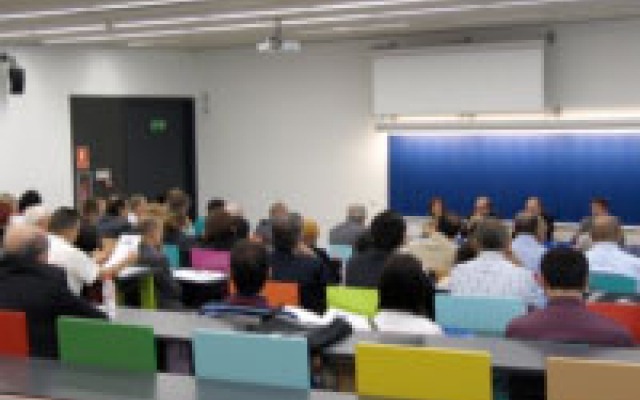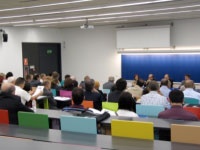research
Arab Spring's economic implications: was poverty a factor?

More than 70 academics from some 20 countries gathered for the 10th International Conference of the Middle East Economics Assocation (MEEA), held from June 23-24 at the Center for Research on the Economies of the Mediterranean (CREMed), research partner of the Barcelona School of Economics.
The conference began with a panel discussion addressing the Implications of the Arab Spring for the economies of the Middle East and North Africa. The panel was made up of invited speakers José García-Montalvo, (Academic Director, CREMed; Professor, UPF), Javier Albarracín (Director, Socioeconomic Development Area, IEMed), and Sohrab Behdad (Professor, Denison University). Moderating the discussion was Prof. Serdar Sayan (President, MEEA; TOBB University of Economics and Technology).
Can we attribute the recent riots in the North African countries to the commonly mentioned factors of unemployment, poverty, and the relative youth of the population?
Prof. García-Montalvo expressed the opinion that these explanations are too simplistic and not supported by data. For example, with the exception of Yemen and Libya, other North African countries have unemployment rates between 9% and 14%, while in Spain the unemployment rate currently exceeds 20%. He also pointed out that although 50% of the inhabitants of Yemen are under 19 years of age, and 50% of Egyptians under 24, the percent of these people who are unemployed is between 17% and 31%, while in Spain the youth unemployment rate is 43.6%. As for poverty as a factor, one of the countries experiencing unrest, Bahrain, has a higher level of income per capita in purchasing power than Spain or Oman, the latter having a level only slightly lower than the Spanish.
Prof. García-Montalvo concluded that, in fact, the social unrest has affected countries across the whole income spectrum (Libya, Tunisia and Algeria at the top and Syria at the bottom). If poverty were a key factor, many other countries would be better candidates for the social upheavals that these countries are currently suffering.

Over 130 academics and professionals debate complex issues of the Mediterranean region at CREMed this week
The MEEA conference continued over two days and included sessions on labor market dynamics and market reforms, gulf economies, trade and foreign direct investment, environmental and resource economics, among others.
This was the second major event hosted at CREMed in June. Early that same week, the Center organized the II Workshop on Economics of the Mediterranean and the Euromediterranean Process together with the European Institute (London School of Economics). More than 60 professors, students and professionals attended the two-day workshop, which addressed growth and business cycles, trade, poverty and inequality, migration, banking, and environmental issues. Keynote speakers included Prof. Favio Canova (ICREA-UPF, CREMed and GSE), Prof. Mehmet Tosun (ERF, IZA, MEEA, University of Nevada, Reno), and Prof. Tarik Yousef (Dean and Senior Research Fellow, Dubai School of Government).
Between the workshop and the conference, CREMed hosted over 130 academics and professionals, providing a space for debate and analysis of the complex economic issues of the Mediterranean region.
Sources from CREMed website:
- 10th International Conference of the Middle East Economics Assocation (MEEA)
- II Workshop on Economics of the Mediterranean and the Euromediterranean Process

